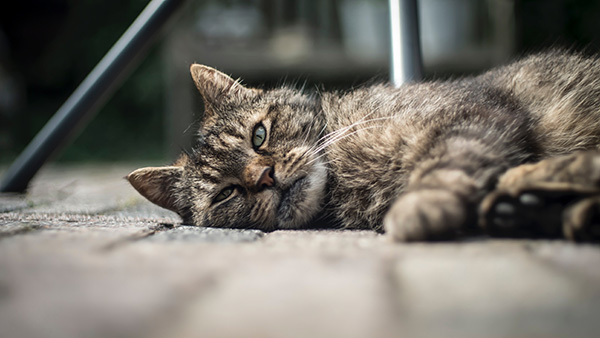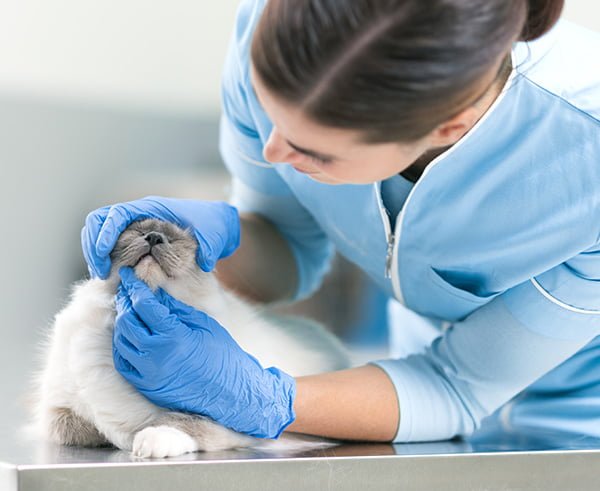As the weather cools down and colds become more common, pet owners often ponder whether the illnesses that affect us can similarly impact our furry companions. A frequently asked question is whether cats can catch colds. Could human cold be passed on to cats? How should you proceed when your cat is experiencing cold-like symptoms?
In this article, we dive into feline upper respiratory infection, a condition commonly likened to the human cold. Our goal is to provide you with a comprehensive understanding of upper respiratory infections, how they affect your cat, and what steps you can take to ensure their health and well-being.
Can cats get colds?
Cats, like humans, can indeed experience cold-like symptoms. These illnesses are known as upper respiratory infections and share similarities with the colds afflicting humans.
What Is An Upper Respiratory Infection
A cat's upper respiratory infection (URI) is akin to a common cold in humans but is specific to felines. Viruses like feline herpesvirus and calicivirus or bacteria such as Chlamydophila felis typically cause these infections. Typical symptoms may involve sneezing, nasal congestion, conjunctivitis, and discharge from the nose or eyes. Additional signs can include fever, lethargy, or a decrease in appetite in some cats.
Upper respiratory infections can easily spread among cats, particularly in crowded places such as shelters. Outdoor cats are more frequently affected by upper respiratory infections than indoor cats. Although typically manageable, upper respiratory infections can escalate into serious conditions, especially for kittens, elderly cats, or those with weakened immune systems, underscoring the importance of seeking prompt veterinary care.
Cat's Cold Symptoms
Cat cold symptoms often stem from upper respiratory infections and can vary. If your cat has URI, you can exhibit one or more of the following cat cold symptoms:
Sneezing
Runny nose
Nasal Discharge
Congestion
Runny or Watery Eyes
Fever
Lethargy
Ulcers in the Mouth or Eyes
More Severe Symptoms
Coughing
Reduced Appetite
Open-Mouth Breathing/ difficulty breathing
The symptoms can vary in intensity from mild to severe, and if not addressed, cat colds can potentially develop into more serious health complications. Cat owners should vigilantly observe their pets and seek veterinary attention if these symptoms persist or intensify. Immediate veterinary care is crucial if a cat begins coughing, experiences difficulty breathing, and shows a diminished appetite.

How Cats Catch Colds
Cat colds, primarily caused by upper respiratory infections, can be attributed to various factors:
Viruses: Feline Herpesvirus (FHV-1) and Feline Calicivirus (FCV) are the most common culprits. These viruses are highly contagious and often responsible for outbreaks in multi-cat environments like shelters.
Bacteria: Secondary bacterial infections can exacerbate a cold. Chlamydophila felis and Bordetella bronchiseptica are notable bacterial agents that can cause respiratory symptoms in cats.
Environmental Stressors: Adverse conditions, including overcrowding, inadequate ventilation, or unsanitary living environments, can induce stress in cats, compromising their immune systems and rendering them more vulnerable to infections.
Close Contact: Direct contact with infected cats or contaminated objects (like food bowls, bedding, or toys) facilitates the spread of the infection.
Weak Immune Systems: Kittens, elderly cats, or those with existing health conditions are more vulnerable to catching colds due to their weaker immune defenses.
Poor Nutrition: A diet lacking in essential nutrients can impair a cat's immune response, increasing the risk of infections.
Comprehending these factors is essential for preventing and managing colds in cats effectively. Regular veterinary check-ups, maintaining a clean and stress-free environment, and ensuring proper nutrition are key steps in safeguarding feline health.
How Is A Cat Cold Diagnosed
A veterinarian's expertise is crucial for an accurate diagnosis when a cat shows signs of a cold, such as sneezing, nasal discharge, or lethargy. The process begins with a detailed review of the cat's clinical history, including the duration and nature of symptoms and any potential exposure to other cats.
During the physical examination, the vet focuses on the respiratory system, checking for signs like nasal congestion, eye discharge, and mouth ulcers. Laboratory tests, including nasal or throat swabs, may be conducted to pinpoint the specific virus or bacteria responsible. In certain cases, blood tests are employed to rule out other potential illnesses. Although rare, severe cases might necessitate imaging tests like X-rays to investigate complications like pneumonia.
The diagnosis often relies on a combination of these observations and test results, ensuring a tailored approach to treatment. Understanding this process is key for cat owners to ensure their feline companions receive timely and effective care.

How Is Cat Cold Treated
Treating a cat with a cold, typically caused by an upper respiratory infection, primarily focuses on alleviating symptoms and supporting the cat's immune system.
Antibiotics may be prescribed to prevent secondary bacterial infections if there is suspicion of a bacterial infection. However, they are ineffective against viruses, often the primary cause of cat colds. Antiviral medications might be used in cases caused by specific viruses, like feline herpesvirus. Always consult your veterinarian before administering any human cold medication or other medications to your cat.
Supportive care is key. This includes ensuring the cat stays hydrated and continues to eat. Appetite can be encouraged by warming food to enhance its aroma. A clean, quiet, and comfortable environment aids recovery. A veterinarian might suggest using a humidifier or taking the cat into a steamy bathroom for nasal congestion.
For more severe cases, supplemental oxygen therapy or nebulization may be necessary. Eye drops or ointments can be employed to address eye infections. Cat owners must follow the vet's instructions closely and keep the cat's living area clean to prevent re-infection. Regular monitoring of the cat's condition is essential, and any worsening of symptoms should prompt immediate veterinary attention.
FAQs
Can cats catch colds from humans?
Cats are susceptible to their own specific types of viruses and bacteria, which are different from those that cause colds in humans. Therefore, a human cold virus is not a risk to a cat. However, it's always good practice to maintain hygiene, like washing hands before handling pets, to avoid spreading other possible infections.
How serious is a cold in a cat?
While most cat colds are manageable and resolved with proper care, they can occasionally lead to more serious health issues, especially in cats with weakened immune systems, elderly cats, or kittens. Complications can include chronic respiratory problems and secondary infections.
How can I prevent my cat from getting a cold?
Prevention strategies include keeping your cat indoors to avoid exposure to sick cats, regular vaccinations, maintaining good hygiene and a stress-free environment, and providing a balanced diet to support the immune system.
Is a cat cold contagious to other cats?
Yes, cat colds are highly contagious among felines. It's advised to isolate a sick cat from other cats in the household and to sanitize shared items and spaces to prevent the spread of the infection.
How long does a cat cold usually last?
The duration of a feline cold can vary, with most cases typically resolving within 1 to 2 weeks. However, recovery time can be longer in cases with complications or cats with underlying health issues. It is crucial to adhere to the treatment plan provided by a veterinarian and to monitor the cat's well-being consistently throughout the recovery process.
